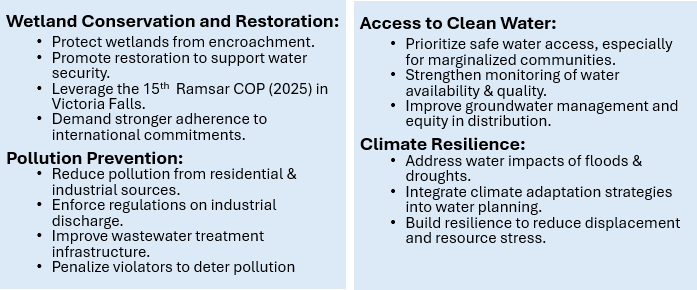Strengthening Research, Knowledge, and Practice for Accountability on Water: Key Insights from the Think-Shop and Collaborative Planning Forum in Zimbabwe
By Esayas Samuel, Regional Program Manager, Water Witness International
On November 12–13, 2024, Water Witness International, together with Combined Harare Residents Association, organized a Think-Shop and Collaborative Planning Forum. The event brought together experts, civil society, and communities to contribute to shaping how water is used, protected, and regulated across Zimbabwe. It was a call to action—and collaboration—for a fairer, more sustainable water future.
Think - shop participants
Throughout the two-day event, it became clear that Zimbabwe's water resources are under pressure from various sectors. Municipalities, industries, agriculture, and mining are all major water users, but they also contribute significantly to its pollution. From artisanal gold mining using toxic mercury and cyanide to the poorly regulated extraction of lithium and the discharge of chemicals from manufacturing industries, these practices have led to contamination of Lake Chivero and the Darwendale Dam, as well as key rivers like the Mazoe, Pungwe, Munyati, and Mukuvisi. This pollution is not only affecting the water quality but also harming the ecosystems that depend on these waterways, leaving communities with fewer and more polluted options for their daily needs.
“There is an overlapping mandate, and also local authorities lack the power to hold companies accountable for their untreated wastewater discharges,” Claude Phuti, Bulawayo, Progressive Residents Association.
The forum emphasized the need for a holistic approach to water security, one that addresses both sustainable use and protection of water sources. A key challenge identified was the unregulated water abstraction, particularly in urban areas, where boreholes have become a primary source of water due to the scarcity of municipal supply. While these boreholes help meet the demands of a growing population, residents interviewed raised concerns about over-extraction of groundwater that may drain aquifers and cause the water table to drop. This problem was made worse by the COVID-19 pandemic, when NGOs drilled shallow wells to provide water access, but many of these wells were poorly regulated, exacerbating risks such as cholera outbreaks.
Rachel Gondo, from Public Service Accountability Monitor
In addition, encroachment of wetlands due to illegal construction projects was highlighted as another pressing issue. Wetlands, which play a crucial role in water filtration, flood prevention, and biodiversity, are being destroyed for urban development. Examples like the Belvedere wetlands—where buildings like Longchen Plaza are constructed—were cited as contributing to increased flooding and the loss of critical carbon sinks. The destruction of these areas also diminishes the natural ability of water systems to manage and filter rainwater, further stressing the already fragile water supply.
Despite these challenges, the forum also brought hope and opportunities for change. A key enabler emphasized is Zimbabwe’s Constitution, enacted in 2013, which expresses water rights as a fundamental human right, particularly under Section 77, guaranteeing access to clean, safe, and sufficient water. Additionally, an important opportunity identified is the upcoming review of the National Water Act, which presents a chance to update outdated policies and establish a more effective, modern regulatory framework for water management. The forum stressed the importance of public interest mechanisms, such as dialogue, advocacy campaigns, petitions, and public interest litigation, which can ensure that decision-makers are held accountable and that water resources are managed equitably.
“The sewer lines in the city are owned by the Harare city council, which gives permits to companies to discharge their wastewater to the system, taking the responsibility to treat the waste to acceptable levels before releasing it into the environment. However, waste treatment plants cannot treat the waste, which leads to the discharge of untreated waste into water bodies. EMA, with the regulatory mandate of these waste treatment plants, is challenged to hold the city council accountable,” Doubt Mhizha, Environmental Management Agency
There was also a call for stronger law enforcement and better coordination between statutory bodies like the Zimbabwe National Water Authority (ZINWA), the Environmental Management Agency (EMA), and local authorities. While these organizations each play a role in managing water, the lack of clear coordination and overlapping mandates often lead to inefficiencies. The forum participants agreed that clearer roles, better communication, and tougher penalties for polluting industries would help improve water governance.
“The polluter pays principle is not working. It is cheaper for companies to pollute and pay penalties than invest in proper wastewater treatment systems,” Rueben Akili, Director of Combined Harare Residents Association.
Another key discussion point was the power of community engagement. Involving local communities in water management is essential for building trust and ensuring that water resources are protected. Successful examples from Harare, where residents’ associations and CSOs have mobilized communities to advocate for clean water and protect wetlands, highlighted the importance of grassroots efforts. Participants also shared how community-based monitoring—using tools like social media and mobile technology—has helped expose violations and raise public awareness, putting pressure on authorities to act.
The forum participants also identified priority areas for action going forward:
Think shop participants
The forum emphasized that solving Zimbabwe’s water challenges will require collaboration across all sectors—from government agencies to civil society organizations, the private sector, and local communities. By working together, sharing knowledge, using technology and action-research, and with the political commitments, Zimbabwe can strengthen accountability and ensure that water resources are managed in a sustainable and equitable way for all.
The discussions at the forum served as a call to action: to protect water ecosystems, reduce pollution, and secure access to water for current and future generations. It’s clear that with the right policies, collaboration, and community involvement, Zimbabwe can turn these challenges into opportunities for lasting change.




